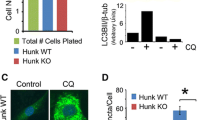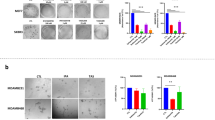Abstract
This study aims to explore the effects of the phosphatase and tension homolog (PTEN) expression level on autophagic status and on the resistance of breast cancer to trastuzumab treatment. PTEN and LC3I/II were knocked down with shRNA expression vectors, which were transfected into estrogen receptor (ER)-positive breast cancer cell lines. After trastuzumab treatment, the changes in the autophagy signal transduction pathways and autophagic proteins (LC3I/II, p62, LAMP, and cathepsin B) in these stably transfected cells were detected using western blot. The cells were also orthotopically implanted into nude mice to explore the influence of PTEN knockdown on tumor size, cell viability, and autophagic proteins after trastuzumab treatment. Similar determinations were performed using the LC3I/II overexpressed shPTEN breast cancer cells (LC3I/II-shPTEN). Downregulation of PTEN and autophagic proteins LC3-I and LC3-II was observed in resistant human breast cancer samples. Knockdown of PTEN and PTEN+ LC3I/II with shRNA in breast cancer cells resulted in increased resistance to trastuzumab. Consistently, trastuzumab treatment could not effectively reduce tumor size. Significant decreases in the levels of autophagic proteins LC3I/II, LAMP, p62, cathepsin B, and PI3K-Akt-mTOR and the signaling pathway protein Akt were found in PTEN knockdown cells, compared to the PTEN normal group, after trastuzumab administration, both in vitro and in vivo. However, these findings were reversed with the LC3I/II-shPTEN treatment. Therefore, the loss of PTEN may promote the development of primary resistance to trastuzumab in breast cancer via autophagy defects.









Similar content being viewed by others
References
Tfayli A, Temraz S, Abou MR, Shamseddine A. Breast cancer in low- and middle-income countries: an emerging and challenging epidemic. J Oncol. 2010;2010:490631.
Cao W, Wang X, Li JC. Hereditary breast cancer in the Han Chinese population. J Epidemiol. 2013;23:75–84.
Slamon DJ, Clark GM, Wong SG, Levin WJ, Ullrich A, McGuire WL. Human breast cancer: correlation of relapse and survival with amplification of the HER-2/neu oncogene. Science. 1987;235:177–82.
Tan M, Yu D. Molecular mechanisms of erbB2-mediated breast cancer chemoresistance. Adv Exp Med Biol. 2007;608:119–29.
Benson JR, Jatoi I. The global breast cancer burden. Future Oncol. 2012;8:697–702.
Boekhout AH, Beijnen JH, Schellens JH. Trastuzumab. Oncologist. 2011;16:800–10.
Nagata Y, Lan KH, Zhou X, Tan M, Esteva FJ, Sahin AA, et al. PTEN activation contributes to tumor inhibition by trastuzumab, and loss of PTEN predicts trastuzumab resistance in patients. Cancer Cell. 2004;6:117–27.
Berns K, Horlings HM, Hennessy BT, Madiredjo M, Hijmans EM, Beelen K, et al. A functional genetic approach identifies the PI3K pathway as a major determinant of trastuzumab resistance in breast cancer. Cancer Cell. 2007;12:395–402.
Pohlmann PR, Mayer IA, Mernaugh R. Resistance to Trastuzumab in breast cancer. Clin Cancer Res. 2009;15:7479–91.
Pandolfi PP. Breast cancer--loss of PTEN predicts resistance to treatment. N Engl J Med. 2004;351:2337–8.
Lin NY, Beyer C, Giessl A, Kireva T, Scholtysek C, Uderhardt S, et al. Autophagy regulates TNFalpha-mediated joint destruction in experimental arthritis. Ann Rheum Dis. 2013;72:761–8.
Shintani T, Klionsky DJ. Autophagy in health and disease: a double-edged sword. Science. 2004;306:990–5.
Kondo Y, Kanzawa T, Sawaya R, Kondo S. The role of autophagy in cancer development and response to therapy. Nat Rev Cancer. 2005;5:726–34.
Corcelle EA, Puustinen P, Jaattela M. Apoptosis and autophagy: targeting autophagy signalling in cancer cells -‘trick or treats’? FEBS J. 2009;276:6084–96.
Abedin MJ, Wang D, McDonnell MA, Lehmann U, Kelekar A. Autophagy delays apoptotic death in breast cancer cells following DNA damage. Cell Death Differ. 2007;14:500–10.
Schoenlein PV, Periyasamy-Thandavan S, Samaddar JS, Jackson WH, Barrett JT. Autophagy facilitates the progression of ERalpha-positive breast cancer cells to antiestrogen resistance. Autophagy. 2009;5:400–3.
Samaddar JS, Gaddy VT, Duplantier J, Thandavan SP, Shah M, Smith MJ, et al. A role for macroautophagy in protection against 4-hydroxytamoxifen-induced cell death and the development of antiestrogen resistance. Mol Cancer Ther. 2008;7:2977–87.
Vazquez-Martin A, Oliveras-Ferraros C, Menendez JA. Autophagy facilitates the development of breast cancer resistance to the anti-HER2 monoclonal antibody trastuzumab. PLoS One. 2009;4:e6251.
Cheney IW, Johnson DE, Vaillancourt MT, Avanzini J, Morimoto A, Demers GW, et al. Suppression of tumorigenicity of glioblastoma cells by adenovirus-mediated MMAC1/PTEN gene transfer. Cancer Res. 1998;58:2331–4.
Davies MA, Kim SJ, Parikh NU, Dong Z, Bucana CD, Gallick GE. Adenoviral-mediated expression of MMAC/PTEN inhibits proliferation and metastasis of human prostate cancer cells. Clin Cancer Res. 2002;8:1904–14.
Tsutsui S, Inoue H, Yasuda K, Suzuki K, Higashi H, Era S, et al. Reduced expression of PTEN protein and its prognostic implications in invasive ductal carcinoma of the breast. Oncology. 2005;68:398–404.
Yang C, Liu Y, Leskow FC, Weaver VM, Kazanietz MG. Rac-GAP-dependent inhibition of breast cancer cell proliferation by {beta}2-chimerin. J Biol Chem. 2005;280:24363–70.
Wen XF, Yang G, Mao W, Thornton A, Liu J, Bast RJ, et al. HER2 signaling modulates the equilibrium between pro- and antiangiogenic factors via distinct pathways: implications for HER2-targeted antibody therapy. Oncogene. 2006;25:6986–96.
Baselga J, Norton L, Albanell J, Kim YM, Mendelsohn J. Recombinant humanized anti-HER2 antibody (Herceptin) enhances the antitumor activity of paclitaxel and doxorubicin against HER2/neu overexpressing human breast cancer xenografts. Cancer Res. 1998;58:2825–31.
Kim JW, Kim DK, Min A, Lee KH, Nam HJ, Kim JH, et al. Amphiregulin confers trastuzumab resistance via AKT and ERK activation in HER2-positive breast cancer. J Cancer Res Clin Oncol 2015.
Acknowledgments
This work has been supported by two grants encoded as 81071851 and 81001189 from the National Natural Science Foundation of China, a grant encoded as S2011010001318 from Guangdong Natural Science Foundation, and a grant encoded as 2012A030400016 from Guangdong Provincial Department of Science and Technology.
Author information
Authors and Affiliations
Corresponding author
Rights and permissions
About this article
Cite this article
Ning, L., Guo-Chun, Z., Sheng-Li, A. et al. Inhibition of autophagy induced by PTEN loss promotes intrinsic breast cancer resistance to trastuzumab therapy. Tumor Biol. 37, 5445–5454 (2016). https://doi.org/10.1007/s13277-015-4392-0
Received:
Accepted:
Published:
Issue Date:
DOI: https://doi.org/10.1007/s13277-015-4392-0




